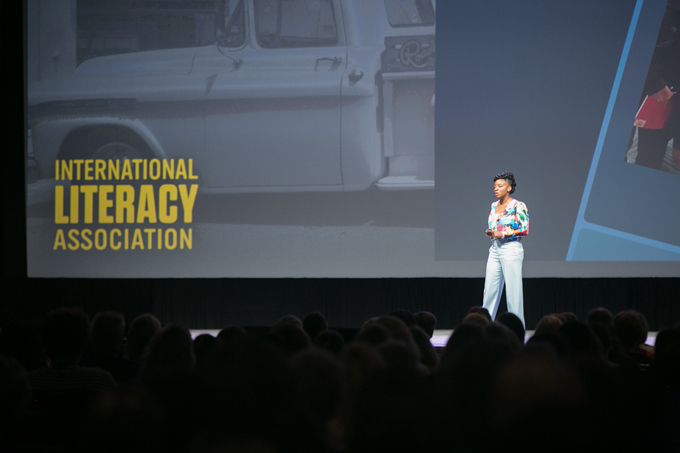 Though just shy of 8 a.m. Saturday, the energy was high as attendees poured through the doors of the Exhibit Hall at the Austin Convention Center. Inside, they danced to live music and posed for pictures in front of the colorful stage, eagerly awaiting the start of General Session.
Though just shy of 8 a.m. Saturday, the energy was high as attendees poured through the doors of the Exhibit Hall at the Austin Convention Center. Inside, they danced to live music and posed for pictures in front of the colorful stage, eagerly awaiting the start of General Session.
ILA Immediate Past President Douglas Fisher welcomed the audience and opened with a powerful quote: “Every student deserves a great teacher. Not by chance, but by design.”
With its theme of “Be a Changemaker,” these words set the tone of the ILA 2018 Conference in Austin, Texas.
Fisher then explored what it means to be a great teacher—one who offers equity in choice and access, advocates for all students’ rights to read and write, and ensures that zip code doesn’t dictate achievement. He said literacy is “the gateway to all other learning and the best anecdote to poverty at our disposal.”
Bernadette Dwyer, ILA President of the Board, said the key to changemaking is persistence: we must “get going, keep going, and get started again.” She encouraged the audience to continue to be curious, to learn, and to advocate for things that matter.
“Change begins with ordinary people—the quiet revolution of changemakers,” she said. “Let’s get started again and again and again until the basic fundamental right of literacy is achieved for all.”
The revolutionary changemakers who followed continued to drive that message home.
Don’t just involve, but engage
When Adan Gonzalez, educator and founder of the grassroots community organization Puede Network, took the stage, he told his story of finding freedom through education. The son of Mexican American immigrants raised in the high-poverty neighborhood of Oak Cliff, Texas, he realized at a young age that the education system wasn’t serving him.
“I became angry at the system, the system of education that became more worried about passing the test than knowing my name or my dreams,” he said. “This system was not created for people like me.”
Gonzalez channeled his frustration into school. The more he read, the more he realized that education would be his escape from poverty. Today, a graduate of Georgetown and Harvard universities, he’s a third-grade teacher at his former elementary school.
Gonzalez spoke about the danger of reducing faces and dreams to data and numbers and about the importance of speaking truth. He closed with a call to action: for all educators to not just involve but engage the communities in which they teach and to build on the strengths there.
Practice “disruptive kindness”
Cornelius Minor, lead staff developer at the Teachers College Reading and Writing Project, followed with the powerful reminder that passion for change is not enough. He called on educators to practice “disruptive kindness.”
“Being nice in the face of oppression is not enough. Nice does not create change—kindness does,” he said. “Kindness means I care enough about you to call you out and help you learn and change.”
He reminded the audience of educators that, although they cannot dismantle the discriminatory systems in government, they can—and should—change the discriminatory systems that govern their classrooms, districts, and schools. If we fail to take action, he said, we choose to accept the problem.
“If you show people a problem with no roadmap to possibility, they can get used to living with the problem,” he said. “I can never get used to this. We can never get used to this.”
Minor left the audience with a four-step plan for becoming a changemaker: study, invent something, try it and measure your results, and ask for collaborative feedback.
Change begins with you
In the final keynote of General Session, Nadia Lopez relayed her story of founding Mott Bridges Academy, a middle school in the Brownsville section of Brooklyn—one of New York City’s poorest neighborhoods, an experience that taught her the importance of knowing students beyond their levels and scores. She reminded the audience that the power of literacy is not about passing a test, but about connecting students to their own stories and to worlds outside of their communities.
“If you give them a name, they will own it,” she said. “If you give them a number, they will focus on what they cannot achieve.”
Lopez shared a few of her students’ success stories as well as her four-part formula for transformation: a vision, a written plan, a tribe, and the audacity to make things happen.
She closed with a powerful message: that change begins with you. She then asked the audience to join her in repeating an inspiring mantra:
“Neighbor, you have been chosen to do a significant job for children who need you. You are liberating minds, transforming communities, hearts, and minds. You matter. You matter. You matter.”
Alina O'Donnell is the communications strategist at ILA and the editor of Literacy Daily.